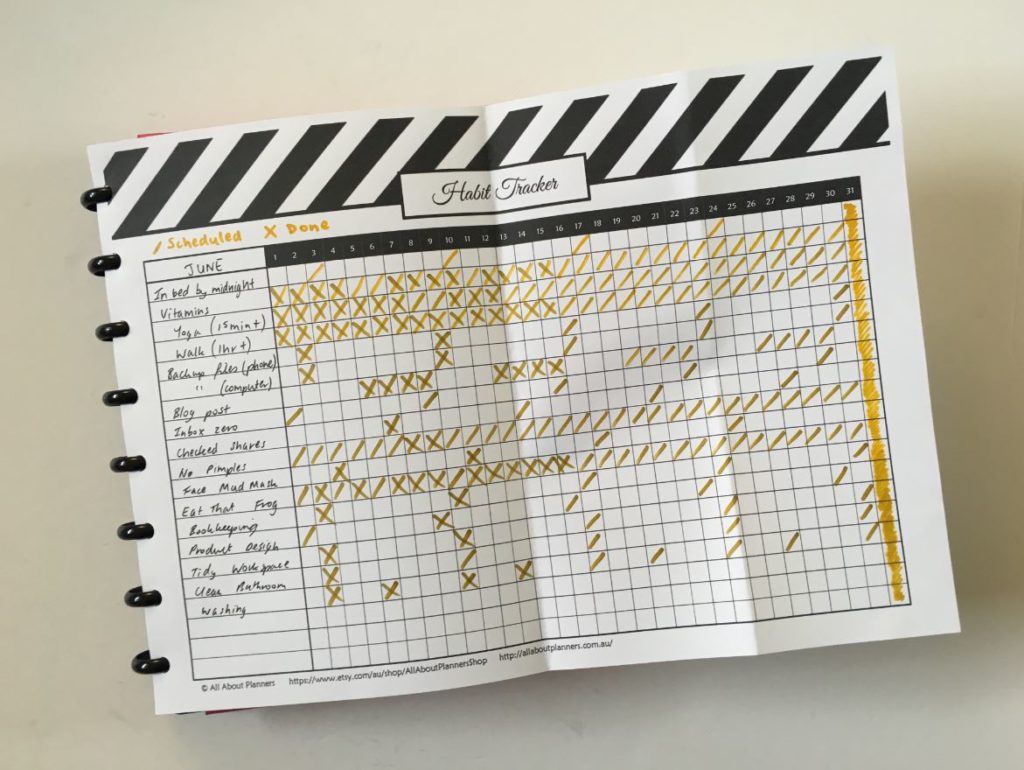You want to be a writer.
You want to write a novel.
You want to own a stack of books with your name on the inside flap.
Alas, your writing is about as consistent as your flossing habit.
Many of us master the dream and goal-setting part of writing a novel. But no matter how exciting your dreams are, there is still something that keeps you from writing consistently.
You need something that makes it so that you can’t NOT write every day. Not the other way around.
And that missing piece, as you’ve probably guessed from the title, is accountability.
When we were kids, we had adults keeping us accountable making sure that we brushed our teeth, ate our vegetables, and went to bed at a decent time.
Now that we’re older, it’s up to us to make sure that we stay disciplined.
But no matter how much we want to write consistently, pure willpower is just not enough to keep us writing day in and day out. More often than not, our willpower fails us.
But thankfully, by putting the following steps into practice, we don’t have to rely on flimsy willpower.
By implementing all- or even just a few- of the twelve steps below, your daily writing will become an unbreakable habit that’ll have your stack of completed novels piling up twice as fast.
1. Identify What Worked Before
Whether you know it or not, with the difficult things you’ve done in the past (maybe writing a lengthy essay, studying for a test, training for an athletic competition) there was probably at least one thing that was keeping you accountable to work hard at it day after day.
Was it a looming deadline, consequences if not completed, friends or family members constantly reminding you, or not wanting to let yourself or someone else down?
Think of a time in your life when you consistently worked hard to achieve something and identify what was keeping you accountable then.
Take another look at what has already worked for you personally in the past. If it worked for you before, it should also work again
2. Have a Deadline
If you did the first step of identifying what kept you accountable for past projects, more likely than not, one of the things that kept you accountable was a deadline.
As much as deadlines are universally despised, they do get the job done.
So set a deadline.
When do you need to finish your first chapter?
When do you need to finish your first draft?
Just make sure that it’s not set too far into the future, otherwise it may not fulfill the purpose of keeping you accountable.
The deadline should be uncomfortably close to make you doubt if you’ll be able to make it. That fear will give you that push to make sure not to skip a day.
Once you have set the deadline, take it seriously.
Resist the urge to move your deadline further into the future whenever it gets close.
Tell someone or multiple people about your deadline. Not only will this set your deadline in stone, but it’ll also make people respect your time more.
3. Have an Accountability Partner
Letting only ourselves down is usually not enough to keep us from making sure to stick with personal goals like writing a novel.
We won't miss a promise we made to a friend, but then fail to do the same thing with writing or any other personal task we want to do for ourselves.
When someone else is counting on you to get something done, the chances of you actually doing it skyrockets.
So take advantage of this and apply it to writing! Tell one to three friends or family members that you are going to start writing every single day, or tell them the date you plan on finishing your novel.
Then ask one of them to regularly check up on your progress. Either every day, every week, or at your big milestones.
When there are people who have expectations of you, your excuses for not writing disappear. Healthy external pressure can motivate you to write.
4. Write with Someone
Writing with a friend will almost guarantee that you will write consistently.
You can write together at the same time, or take turns alternating writing the chapters. This is a great idea because you can bounce ideas off of each other and help each other out when one of you gets stuck.
If you skip a day of writing, your friend will be sure to let you know. Now that this is a team effort, you need to play your part.
If the possibility of your friend being disappointed that you're not writing as much as you said you would won’t keep you accountable and consistent, I’m not sure what will.
So ask a friend that is interested in creating stories to write a novel with you!
If none of your friends enjoy writing and decline your invitation, then post the invitation to the Kingdom Pen forum and ask if anyone would like to collaborate on creating a novel together.
There is probably at least one writer on the forum right now desperately wishing for a writing partner to create amazing stories with!
5. Use a Habit Tracker
A habit tracker is a simple way to measure whether or not you did a habit.
The most basic way to use a habit tracker is to print out a calendar, and cross off each day you work on said habit. Whether that be writing or any other other habit you wish to make.
If you want habit trackers then just type in “habit tracker template” and there will be dozens of printable decorated habit trackers. Or you could type in “habit tracker ideas” and make one yourself with some pens and markers based on a habit tracker that catches your eye.
When you have a habit tracker in a notebook or in an app staring expectantly at you everyday, it’s hard not to ignore it. It’s going to remind you to write every time you see it.
And by filling in those little boxes each day, you won't want to break the chain.
The longer the chain gets, the less you want to break it. If you take a break on day 100, then you'll have to start all the way back at day one. That would be a tragedy!
So just like that, your writing will stay on track.
6. Share Progress on Social Media
Using the power of social media can be a great tool for keeping yourself accountable.
You can use an existing social media account, or create a whole new account dedicated to your writing journey.
You could write in your profile description that you are committed to writing x amount every single day for x amount of time and that you’re going to post daily updates on your progress.
Now you have followers watching and cheering you on to write and share your progress. You wouldn’t want to fail in front of them, would you?
7. Blog or Vlog Your Journey
Much like social media, you could create a blog for the purpose of logging and sharing your story’s progress.
Sharing how much you have written so far, what you struggled with, what has helped you, and so on.
Announcing to the world on a blog or vlog that you're committed to writing will make writing feel more like your responsibility, duty, and purpose.
8. Track Daily Word Counts
There are few things that can be as rewarding as seeing tangible consistent progress in something that is important to you.
Doing the simple task of tracking your daily word count is an easy way to apply this to writing.
A spreadsheet or an app like Wordly are great tools where you can visually see your progress.
Over time, you'll start seeing your word count get higher and higher each day as you get faster and better at writing. It will feel rewarding as well as keep you accountable.
This is a great way to gamify the writing process. You will get excited to come back to your work-in-progress day-after-day and try to beat yesterday’s number.
9. Join the Kingdom Pen Forum
Writing without a community can get lonely, thus making it a pain to show up to write everyday.
But, by joining a writing forum like one we have here on Kingdom Pen, you don’t have to be a lonely writer!
On the KP forum, writers from around the world are supporting and encouraging one another. It is the perfect place to get inspired as well as stay accountable with your writing.
Talking about your novel with other like-minded writers will make you want to finish it more than ever. They will encourage you, help you with problems you have, motivate you, and also can act as accountability partners to check in with how your progress is going.
So if you’ve been debating on whether or not to join the forum, take this as your call to join, and start sharing your progress!
10. Have a Negative Consequence
Having a carrot (reward) is great, but don’t forget the stick! Give yourself a negative consequence if you miss your writing time.
This could be doing a chore for someone else in your family, doing burpees for 3 minutes straight, or having an extra helping of a food you don’t like at dinner.
Sometimes consequences are more motivating than rewards
So find out what motivates you to NOT want to miss your writing time!
Write down what bad thing is going to happen if you don’t write, and tape it to your bedroom wall, mirror, or your laptop. Every time you walk by and see the little consequence you’ll get if you don’t write, will remind you to make sure to write before you do anything else!
11. Schedule Your Writing Time
If you're just waiting around for time to show up so that you can write, you will be waiting for a very long time. Maybe even forever.
Time doesn’t just show up, you must make it.
That means making sacrifices.
“If you don't have time, the truth is, you don't have priorities.” ~ Tim Ferriss
Be honest with yourself.
How much time are you really spending scrolling on social media, watching tv, watching YouTube videos, and other things you know are a waste of time?
I challenge you to spend an entire week tracking every single little thing done by the hour.
Track getting ready in the morning, taking that quick check of the news, eating leftover pizza from the fridge, and every single thing else you do in a day.
Be BRUTALLY honest with yourself, and you’ll be surprised with how much time you're wasting that could be spent on writing.
Fifteen minutes here. Ten minutes there. Wasted time quickly adds up.
Then write out your schedule for the upcoming day and block out a section of time dedicated to writing.
And a tip to make sure you get enough time to write: make sure the block of time you’ve scheduled for writing is more time than you need.
More often than not, you might be late to your writing time or it may get cut off early by something unexpected.
So if you want to write for an hour, set aside 90 minutes in your schedule for writing, so mistakes won’t derail you from your writing.
12. Set an Alarm
Our memories are far less than perfect, but thanks to our phones, they don’t have to be!
Set an alarm labeled either ‘writing’, ‘the name of your novel’, or even ‘Ahem! You're forgetting something!’ Label it something that grabs your attention everytime it’s time to write.
Now you don’t have to worry about your writing time flying by and your writing time passing without you realizing.
It can be disheartening when you have a dream of completing a novel, but never end up actually writing, no matter how hard you try to force yourself.
Relying on grit and willpower may work for a couple days, but setting up accountability strategies will last much longer, and will have you writing from inspiration and motivation instead of the feeling that you have to find pleasure in a chore.
Don’t worry about doing everything on the list, or even half of the list. Choose 2-3 tips and start implementing them right away.
Once I started using some of these tips, writing consistently became so much easier to do. Just a little writing a day goes a long way. Every word you write is one step closer to becoming a successful writer!
So what tip/tips are you going to start using today? Do you have any tips of your own that you use to keep yourself accountable?
Rak Chazak Amats!
- Kathleen Ramm
Kathleen Ramm
Kathleen’s first writing project was a rip-off of the tortoise and the hare. She continues to write because when she was little she tried to enter Narnia multiple times, but they never let her in. Her only other alternative was to create worlds and characters of her own.
Kathleen joined Kingdom Pen because she was inspired to help writers at any level to write badly so that they can write goodly.
She enjoys writing with her siblings, doing Taekwondo, and sketching. Her greatest accomplishment is getting first place in a Taekwondo tournament (and there was only one other contestant).
Get Your Free Guide
Sign up to get your free guide on building a writing habit!














I’ve been using wordly lately and it has worked so well!! Looking at the data is so aesthetic (when there are words there…. it’s kind of boring at 0 😉 ) Thanks for this amazing compilation of tips!
Glad you liked the post! Yeah, tracking your word count is great until you don’t have any words to track.XD
Yeeessss. I absolutely LOVE Wordly as well!
Hey! My flossing schedule is private! …Great post, by the way.
Somehow your flossing schedule got leaked to the public. Eh, sorry about that.
Great article, Kathleen! A lot of these tips could apply for being more consistent at anything, not just writing!
Awesome article! My favorite is definitely the last one: setting the alarm. Hm, I need to start doing that more.